This article relies largely or entirely on a single source .(July 2022) |
This is a list of members of the 8th National Assembly of South Korea which sat from 26 July 1971 until 17 December 1972. [1]
This article relies largely or entirely on a single source .(July 2022) |
This is a list of members of the 8th National Assembly of South Korea which sat from 26 July 1971 until 17 December 1972. [1]
| Date | Constituency | Incumbent | Party | New member | Party | Notes | ||
|---|---|---|---|---|---|---|---|---|
| 5 October 1971 | Proportional representation | Gil Jae-ho | Democratic Republican | Kim Ok-ja | Democratic Republican | Incumbent resigned on 5 October 1971; replaced by the next member in the Democratic Republican list. | ||
| 14 December 1971 | Dalseong–Goryeong, North Gyeongsang Province | Kim Seong-gon | Democratic Republican | Park Jun-gyu | Democratic Republican | Incumbent resigned on 5 October 1971. New member by-elected. | ||
| 21 January 1972 | Proportional representation | Hwang Jong-ryul | Democratic Republican | No Jin-hwan | Democratic Republican | Incumbent died on 21 January 1972; replaced by the next member in the Democratic Republican list. | ||

The history of South Korea begins with the Japanese surrender on 2 September 1945. At that time, South Korea and North Korea were divided, despite being the same people and on the same peninsula. In 1950, the Korean War broke out. North Korea overran South Korea until US-lead UN forces intervened. At the end of the war in 1953, the border between South and North remained largely similar. Tensions between the two sides continued. South Korea alternated between dictatorship and liberal democracy. It underwent substantial economic development.
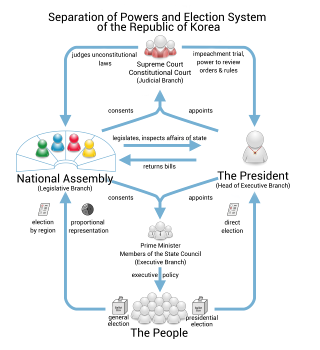
The politics of South Korea take place in the framework of a presidential representative democratic republic, whereby the president is the head of state, and of a multi-party system. To ensure a separation of powers, the Republic of Korea Government is made up of three branches: legislative, executive, and judicial. The government exercises executive power and legislative power is vested in both the government and the National Assembly. The judiciary is independent of the executive and the legislature and comprises a Supreme Court, appellate courts, and a Constitutional Court.

The president of the Republic of Korea, also known as the president of South Korea (Korean: 대통령), is the head of state and head of government of the Republic of Korea. The president leads the State Council, and is the chief of the executive branch of the national government as well as the commander-in-chief of the Republic of Korea Armed Forces.
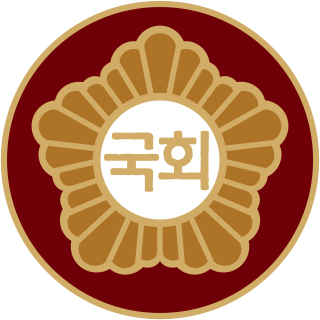
The National Assembly of the Republic of Korea, often shortened to the National Assembly, is the unicameral national legislature of South Korea. Elections to the National Assembly are held every four years. The latest legislative elections was held on 10 April 2024. The National Assembly has 300 seats, with 253 constituency seats and 47 proportional representation seats; 30 of the PR seats are assigned an additional member system, while 17 PR seats use the parallel voting method.

Kim Jong-pil, also known colloquially as JP, was a South Korean politician and the founder/first director of the Korean Central Intelligence Agency. He served as Prime Minister twice, from 1971 to 1975 during the presidency of Park Chung Hee (1961–1979) and from 1998 to 2000 during the presidency of Kim Dae-jung (1998–2003). He was a nine-term National Assembly member.

The prime minister of the Republic of Korea is the deputy head of government and the second highest political office of South Korea who is appointed by the President of the Republic of Korea, with the National Assembly's approval. The prime minister may be a member of the National Assembly, but this is not required to hold the office. The prime minister of South Korea is not the head of government of South Korea, for the President is both the head of state and government in the country.

The Third Republic of South Korea was the government of South Korea from December 1963 to November 1972. The Third Republic was founded on the dissolution of the Supreme Council for National Reconstruction that overthrew the Second Republic and established a military government in May 1961. Park Chung Hee, the Chairman of the Supreme Council, was elected President of South Korea in the 1963 presidential election.

The Fourth Republic of Korea was the government of South Korea from November 1972 to March 1981.
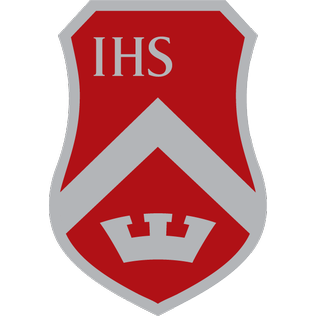
Sogang University is a private research university in Seoul, South Korea. It was established in 1960 by Fr. Theodore Geppert, SJ with the Wisconsin Province of the Society of Jesus with the school being the oldest Jesuit institution of higher education in the country.

Choe Yong-gon was the Supreme Commander of the Korean People's Army from 1948 to 1950, North Korean defence minister from 1948 to 1957, and the Chairman of the Standing Committee of the Supreme People's Assembly of the Democratic People's Republic of Korea from 1957 to 1972.

Yeouido is a large island on the Han River in Seoul, South Korea. It is Seoul's main finance and investment banking district. It is 8.4 square kilometres (3.2 sq mi) large and has a population of 32,674 as of August 2023.
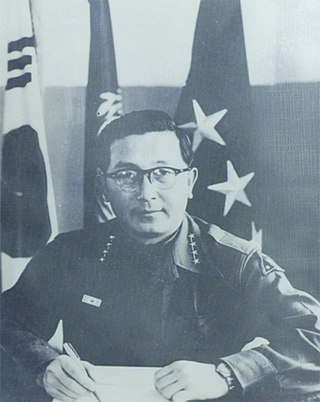
Chung Il-kwon was a South Korean politician, diplomat, and soldier. A general in the Republic of Korea Army, he served as Foreign Minister 1963 to 1964, and Prime Minister from 1964 to 1970. He was an ally of President Park Chung Hee.

Early presidential elections were held in South Korea on 9 May 2017 following the impeachment and removal of Park Geun-hye. The elections were conducted in a single round, on a first-past-the-post basis, and had originally been scheduled for 20 December 2017. However, they were brought forward after the decision of the Constitutional Court on 10 March 2017 to uphold the National Assembly's impeachment of Park. Following procedures set out in the Constitution of South Korea, Prime Minister Hwang Kyo-ahn succeeded Park as the acting president. After Park was removed from office by the Constitutional Court's ruling, acting president Hwang announced he would not run for a term in his own right.

Legislative elections were held in South Korea on 13 April 2016. All 300 members of the National Assembly were elected, 253 from first-past-the-post constituencies and 47 from proportional party lists. The election was an upset victory for the liberal Democratic Party, which defied opinion polling by winning a plurality of seats in the election and defeating the ruling conservative Saenuri Party by one seat. In votes for party lists, however, Democratic Party came third, behind the Saenuri Party in first place and the new People Party in second.

The Republic of Korea and the Democratic People's Republic of Korea were simultaneously admitted to the United Nations (UN) in 1991. On 8 August 1991, the UN Security Council passed Resolution 702, recommending both states to the General Assembly for membership. On 17 September 1991, the General Assembly admitted both countries under Resolution 46/1.

The Democratic Party of Korea, formerly known as the New Politics Alliance for Democracy, is a centrist-liberal South Korean political party. The DPK and its rival, the People Power Party (PPP), form the two major political parties of South Korea.

Legislative elections were held in South Korea on 15 April 2020. All 300 members of the National Assembly were elected, 253 from first-past-the-post constituencies and 47 from proportional party lists. They were the first elections held under a new electoral system. The two largest parties, the liberal Democratic Party and the conservative United Future Party, set up new satellite parties to take advantage of the revised electoral system. The reforms also lowered the voting age from 19 to 18.
Legislative elections in South Korea determine the composition of the National Assembly for the next four years.
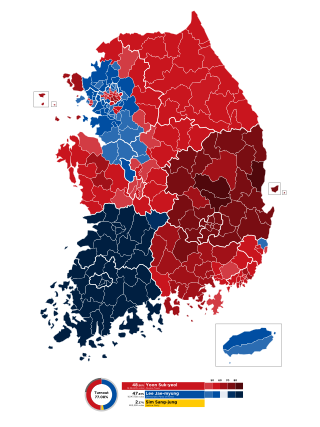
Presidential elections were held in South Korea on 9 March 2022. Under the South Korean constitution, presidents are restricted to a single five-year term, meaning that incumbent president Moon Jae-in was ineligible to run for a second term. Opposition candidate Yoon Suk Yeol of the People Power Party won the election, defeating candidate Lee Jae-myung of the incumbent Democratic Party.